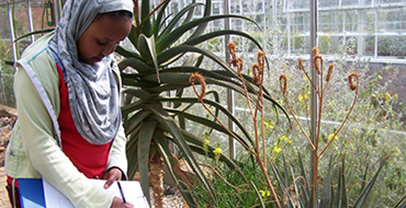Botanic Garden and Attenborough Arboretum
International Sporting event?
Note this activity can be linked to the next international sporting event such as the Commonwealth Games, World Cup or the Olympics.

- Learn about the background involved in hosting major international sporting events
- Visit the tropical, desert, alpine and warm temperate glasshouses to experience the climates and the plants that grow in different countries.
- Use data loggers to compare temperatures in different climates
- Debate the pros and cons of hosting big international sporting events in an exciting simulation role-play exercise.
The programme starts with an introduction to the countries we will discuss and their varying climates. We look at how climate affects daily life in these countries and what particular effects it might have on athletes.
The day is then split into two activities - one completed in the morning, the other in the afternoon.
- Investigating different climatic areas around the Botanic Garden
The children visit different areas of the Botanic Garden (including the glasshouses) which represent the climates of different countries e.g. tropical for Brazil, desert for Namibia, Warm temperate for Spain and outside for temperate for Great Britain. This will be adapted to the next international sporting event. In each area of the Botanic Garden there are plants with information cards from which the children need to record one interesting fact. The cards focus on how the plants are adapted to live in each habitat. The children also record the temperature using data loggers - A lively, interactive simulation activity examining some of the issues for countries and their people in hosting an international sporting event.
The class is divided into citizen groups of an imaginary country who decide how hosting an international sports event would affect them and then debate the whether they would vote for or against the opportunity. This exercise always raises many practical and ethical issues about how people's livelihoods can be changed relating to to real country situations
The day finishes with a plenary session to draw together what the children have learnt.
- Numbers: one/two classes
- Timing: All day
- Cost: Please visit our programme costs page
- Lunch: Lunch can be eaten outside or in the classrooms
- Staff: A member of the Botanic Garden teacher team will lead your activities throughout the day